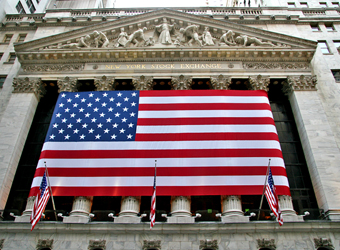U.S. stocks closed mixed Friday after a choppy trading session with NBC News reporting the House pulled a key health-care bill.
“I think you will have a rally if he pulls the bill. He didn’t have the votes to get it done,” said Art Cashin, director of floor operations at the NYSE for UBS.
“They’ll now move on to tax reform. at least that’s what the market will believe and the market will move on,” the director further added.
The Dow Jones industrial average, which had traded more than 100 points lower earlier in the session, closed about 60 points lower.
The 30-stock index had also traded positive Friday.
Art Hogan, chief market strategist at Wunderlich Securities said the market had not spiraled lower earlier in the session because Trump had been clear that if this doesn’t get passed, they’ll move on.
The S&P 500 closed about 0.1 percent lower, with materials lagging. The health care sector turned positive following the news.
The Nasdaq composite outperformed, rising 0.2 percent after briefly dipping into negative territory.
The major indexes posted weekly losses.
The vote, which was originally scheduled for Thursday before a delay, was pulled from the floor shortly ahead of the close. House Speaker Paul Ryan is scheduled to hold a news conference at 4 p.m. ET.
Treasurys rose, as the benchmark 10-year note yield dipped below 2.4 percent.
“No vote means buy bonds,” said Ian Lyngen, head of U.S. rate strategy at BMO Capital. “If we price out the positive momentum the bill appeared to have and we question what this means for other reforms, and trump’s overall level of political capital that would be constructive for the Treasury market.”
The House vote was seen as crucial for the Trump agenda. Trump has said the repeal and replacement of Obamacare must happen before action can be taken on his other plans, including a major tax reduction.
“From an economic perspective, there really isn’t that much juice here,” said Brad McMillan, chief investment officer at Commonwealth Financial Network.
“The bigger issue here is political. Right now, this is a ‘put up or shut up’ moment for Republicans because they have been talking about this for years,” McMillan noted.
Expectations for such policies had been a boon for the stock market’s postelection rally.
Republicans need 215 votes to pass the health-care proposal because one Democrat is expected to be absent.
Stocks suffered their worst day of the year earlier this week, in part, because of the concerns surrounding the health-care vote. The Dow and S&P indexes on Tuesday recorded their first 1 percent declines since Oct. 11.
“While Trump has threatened that without a vote to the health-care bill he will move on to other agenda’s, markets may interpret a potential failure today as something that could create some headwinds for the pending tax reforms and infrastructure spending,” said Lukman Otunuga, research analyst at FXTM, before the bill was pulled.
In economic news, durable goods orders rose 1.7 percent in February, above the expected increase of 1.2 percent. The IHS Markit manufacturing PMI, meanwhile, hit a five-month low of 53.4.
The dollar also traded marginally lower against a basket of currencies, with the euro near $1.08 and the yen around 111.
The Dow Jones industrial average fell 59.86 points, or 0.29 percent, to close at 20,596.72, with Goldman Sachs leading decliners and Nike the top advancer.
The S&P 500 fell 1.98 points, or 0.08 percent, to end at 2,343.98, with materials leading seven sectors lower and utilities outperforming.
The Nasdaq composite advanced 11.04 points, or 0.19 percent, to 5,828.74.
Advancers and decliners were about even at the New York Stock Exchange, with an exchange volume of 397.30 million and a composite volume of 2.631 billion at the close.
The CBOE Volatility Index (VIX), widely considered the best gauge of fear in the market, traded near 13.
Source: CNBC


